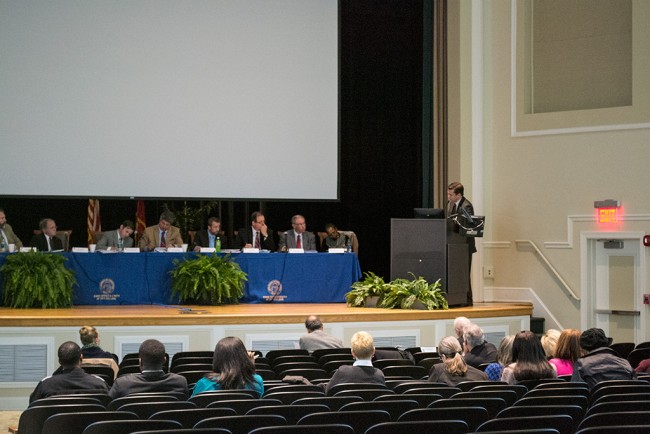The Governor’s Special Council on Criminal Justice Reform invited organizations from across the state to present recommendations for improving ex-offender outcomes at the Department of Corrections Headquarters in Forsyth, Georgia, Tuesday, November 26.
Eric Cochling, VP of Policy Advancement for Georgia Center for Opportunity, testified before the council with proposals generated from GCO’s Prisoner Reentry Working Group on ways to improve employment opportunities for Georgia’s ex-offenders.
- Georgia Center for Opportunity’s Eric Cochling testifying before the Governor’s Criminal Justice Reform Council.
He outlined the following five recommendations for the state to consider implementing:
- Lift driver’s license suspensions for drug offenders who have not committed a driving-related crime.
- Ensure offender’s identification is secured prior to release so they will be ready to apply for a job upon leaving prison.
- Incentivize employers to hire ex-offenders through offering tax credits or deductions, a bonding program, and protection from liability.
- Increase ex-offenders’ chances of being hired by postponing questions about criminal convictions until after an interview has been conducted, with the state setting the example by implementing this recommendation for public employment first.
- Lift professional licensing restrictions to allow ex-offenders to work in occupations that were previously off-limits to them because of a felony conviction that is unrelated to the professional license being sought.
Testifying before the Governor’s Council proved to be a critical first step in presenting GCO’s working group findings to state leaders, as the council consists of legislative, judicial, and executive appointees, as well as representatives from various sectors of criminal justice at the state and local level.
Established by the Governor in 2011 to protect public safety and hold offenders accountable while controlling state costs, the council has proposed significant reforms for adult sentencing and corrections and juvenile justice. Due to the success of the council’s recommendations and landmark legislation being passed during the 2012 and 2013 legislative sessions, Governor Deal commissioned the council to focus on improving prisoner reentry in the state next year, too.
For the upcoming 2014 legislative session, the council is working diligently to compile the best recommendations for the state to implement to reduce recidivism. However, due to the scope of this assignment, bills outlining the council’s recommendations may be introduced over the next couple of sessions.
Eric’s presentation received a positive response from council members leading them to ask several follow-up questions about other states that have enacted similar reforms. GCO is grateful for the opportunity to present and hopes that the council seriously considers our recommendations.
The recommendations for increasing employment opportunities for ex-offenders represent a sample of the reforms being proposed by GCO’s working group. Future recommendations will likely include ways to reduce debt and increase savings for prisoners, establish reentry courts, and implement specialized transitional centers across the state, among others.

